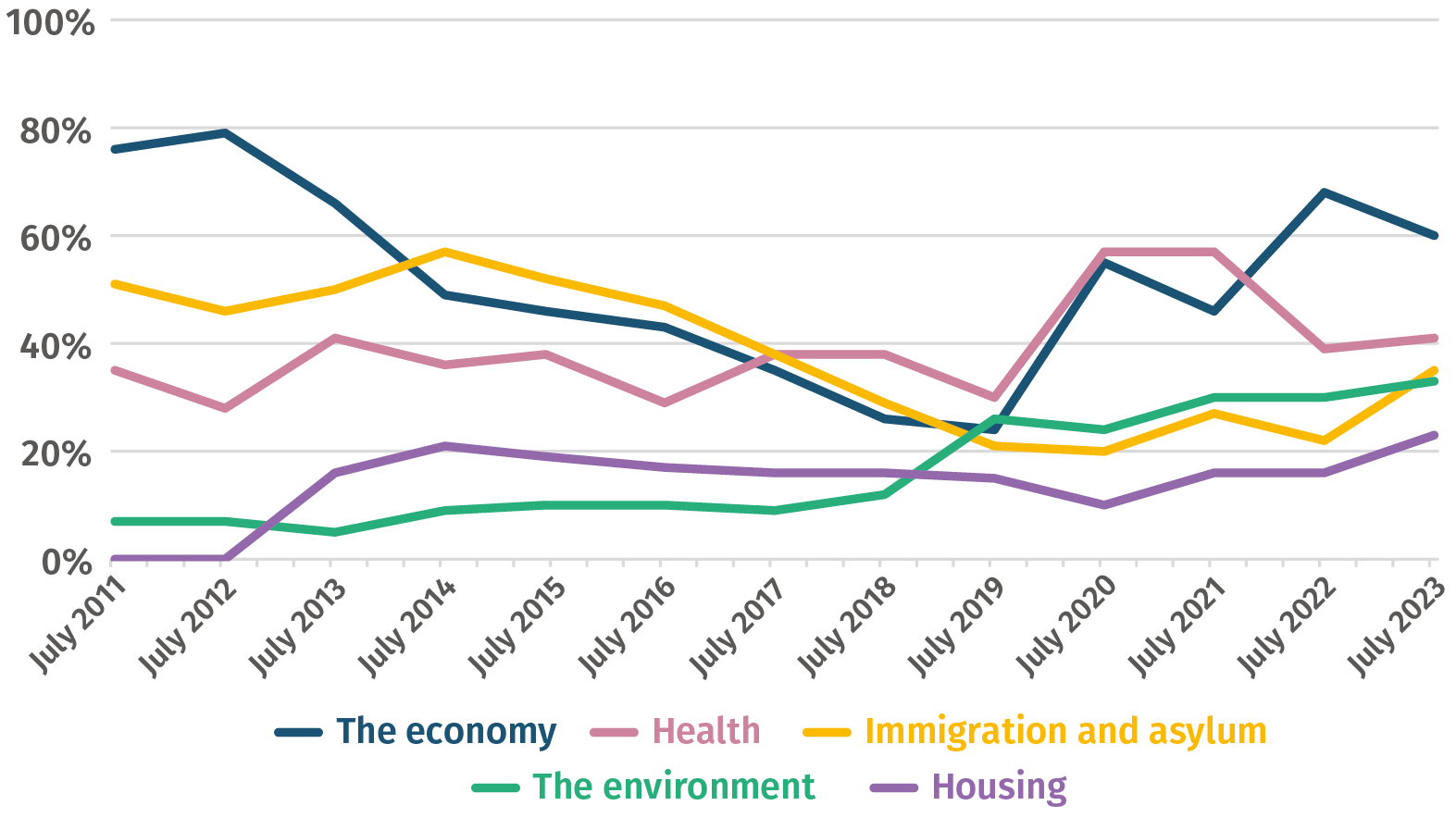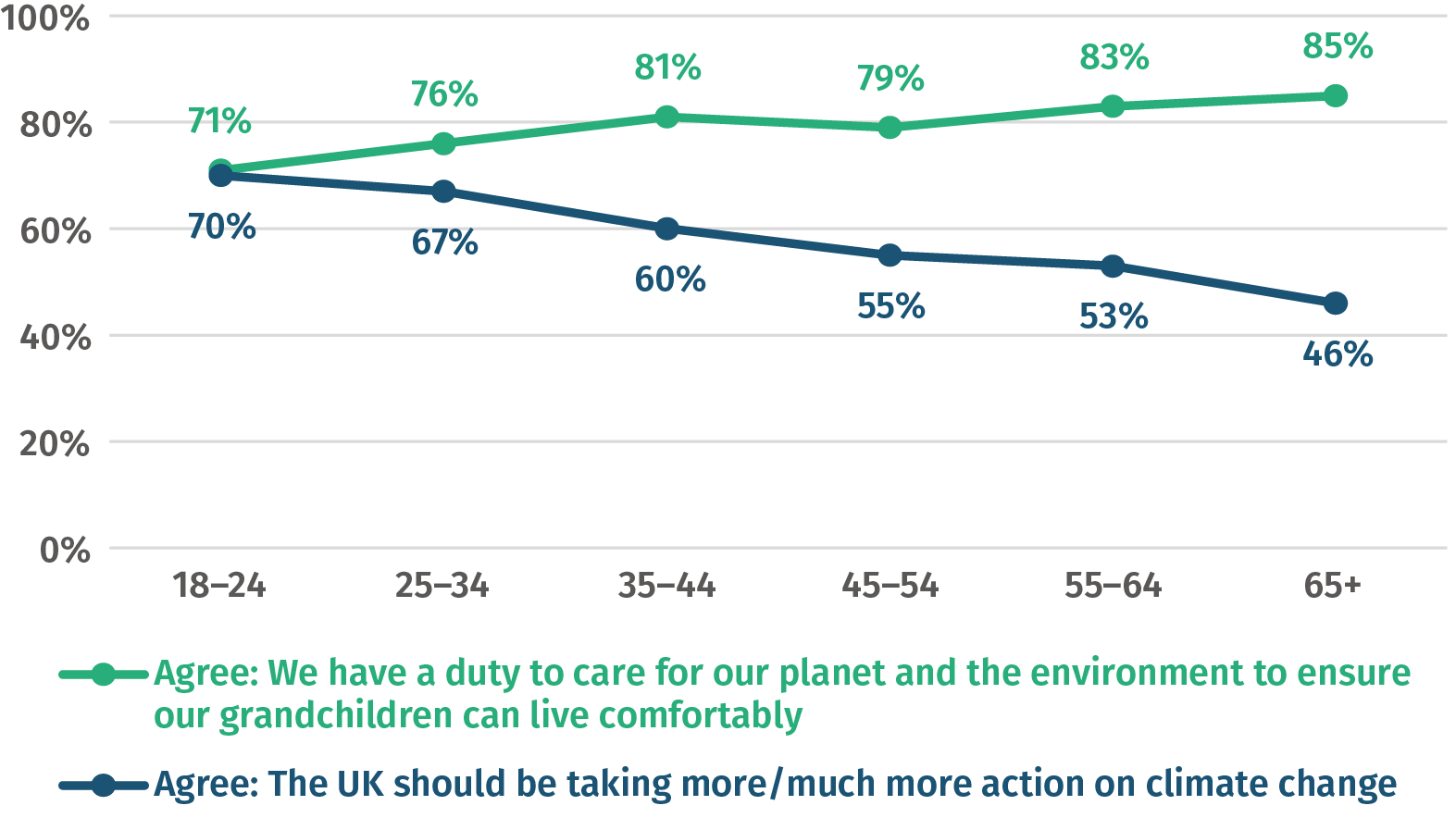Politicians have a public mandate for climate leadership
Article
The public know that climate change is a major long-term risk to their family and community and are waiting for leadership, argues Sam Freedman.
In a crowded field July’s Uxbridge by-election is on its way to being the most over-interpreted event in British political history. Labour failed, by 500 votes, to gain a seat they have never held. The prospect of ULEZ car charges to reduce pollution was one factor (we don’t know how large). From this some, on both sides of the political aisle, seem to have drawn the conclusion that the British public has become rabidly anti-environmentalist.
Anyone who tells you they can interpret the precise beliefs of the median voter on complex policy issues should be treated with suspicion. The average person spends, reasonably enough, very little time thinking about politics at all. In 2021 over 60 per cent of people said they knew little or nothing about ‘net zero’ and people typically pretend to know more than they do with those types of questions.
When it comes to detailed policy challenges polling can give a spurious sense of precision but subtle changes to wording or information offered can completely change the result, because views are often not held particularly strongly. For instance in the last few months YouGov have found that 42 per cent of people support new licences being granted for oil and gas drilling in the North Sea but also that only 32 per cent of people oppose a complete ban on new drilling.
So what can we tell about the politics of climate change? First that the vast majority of people believe that it is happening, is due to human activity, and is a problem. People are also getting more worried about it. YouGov tracking data shows that in 2011 just 7 per cent said ‘the environment’ was one of the top three most important issues for the country; that number is now 33 per cent. Back then almost seven times as many people said immigration was a top three issue, now the numbers are roughly equal. Though climate change is often seen as a ‘young people’ topic the differences between ages are not huge, with 25 per cent of pensioners saying it’s a top three issue.
Figure 1: Climate change is consistently viewed as one of the most important issues facing the country
YouGov weekly tracker of the most important issues facing the country

Source: YouGov weekly tracker. Note: Figure shows the issues considered to be the most important issues facing the country today and their change over time
It's also clear that people consider the government has a role in doing something about it. There is overwhelming support in principle for net zero – and for specific policies like increasing investment in renewables. As John Burn-Murdoch has highlighted there’s even net support for policies that sound like they’d have a personal cost to at least some voters, including banning new petrol and diesel cars after 2030 and taxing frequent flying.
But we do have to be careful about over-interpreting this data. Poll respondents are not great at predicting their responses to policies. For instance in August 2021 there was net 47 per cent support for increasing national insurance to increase healthcare budgets. One month later when this policy was actually introduced by the government it fell to 1 per cent.
Equally, though, as this example shows, cost/benefit trade-off apply to all policies, not just environmental ones. As Steve Akehurst has pointed out, while it’s true that 42 per cent of people told one pollster last year that they wouldn’t be willing to pay any increase in tax to fund ‘action on climate change’, the number was almost identical for ‘reducing crime’. Guess what – people don’t like paying taxes! But no sane politician would deduce from this that they could gain popularity by saying they were going to cut the police force and close some prisons.
Ultimately no amount of parsing polls can tell politicians what to do, it is their job to lead and persuade by emphasising the benefits over the costs. And in particular the risks of inaction. Risk aversion is a much better lens for thinking about public opinion that the traditional left/right axes of political commentary. The median voter thinks criminal justice policy is too soft; that immigration is too high; that not enough is spent on public services; that the government isn’t doing enough on climate change; and that Covid lockdowns were the right call. This picture doesn’t conform to the positions of any media outlet or political party but in each case the result can be explained by a dislike of perceived risk to one’s family and community.
Extensive polling by the IPPR and Onward think tanks emphasises the point. One unsurprising lesson is that using abstract terms is less persuasive than drawing concrete attention to ongoing risks to family wellbeing. Onward found 46 per cent of older voters (over 65) agreed that ‘the UK should be taking more action on climate change’ but 85 per cent agreed that ‘We have a duty to care for our planet and the environment to ensure our grandchildren can live comfortably’.
Figure 2: Older people are more concerned about the environment when it is framed as an issue for their grandchildren
Source: Public First, 15-23 February, Onward analysis
Perhaps, less obviously, messages that seek to counteract rhetoric around costs by talking about the economic value of climate change policies land less well. IPPR even found a slight ‘backfire effect’, whereby arguments on the future jobs and consumer benefits that could ensue from environmental policies made voters a bit less willing to pay for them than a control group. This may be partly because voters are less inclined to respond to indirect promises given trust in politicians is so low. But I suspect it is primarily because highlighting risk is always going to be most effective. Again language about the actual impact of climate change (in a way that avoided fatalism) plus the impact on future generations was the most powerful message in moving voters in the right direction.
Making these arguments is, sadly, only going to get easier as the real world impacts of climate change become increasingly apparent. The more there are extreme weather events, images of famine and destruction, and even ruined holidays, the more the sense of risk grows. Over time one would expect the issues of migration and climate change to mesh somewhat as it becomes clearer that people are leaving parts of the world that are becoming uninhabitable.
The political difficulties of imposing specific costs on voters can’t be ignored, and challenges with ULEZ are a good reminder that environmental policies still need to be well designed with targeted support for those who can afford the least. The far bigger political danger, though, is being caught on the wrong side of a visibly growing problem and looking complacent or blind to the risk. It’s true that it’s not a problem Britain can solve by itself, but politicians giving the impression of helplessness rarely plays well.
The public might not know the policy detail; but they know that climate change is a major long-term risk to their own families and communities, and are waiting for leadership. Any politician who, looking at the data we have, concludes it’s all too difficult and people are unpersuadable, is in the wrong job.
